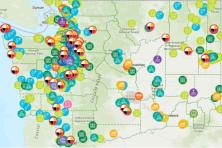In the immediate aftermath of Election Day 2014, our national media machine is greased with stories repeating that the prospects for action on climate have shrivelled to tiny proportions. Handy narrative by the fossil fuel industry to try and perpetuate, but it’s not true.
Image

Local organizing produced climate victories at the ballot box
Did the fossil fuel industry win as far as the races they bought and influenced? In many places, yes. But a number of local and state ballot results from across the nation point to a different story: local organizing fights back against the fossil fuel industry—and creates space for real conversations among voters about the issues impacting their everyday lives.
First up, Denton, TX. Many following the issue of fracking likely saw that there were several successful ballot measures to ban fracking in several states, including two California counties and Athens, OH. But Denton is special; it’s the birthplace of fracking. It’s the first city in Texas to ban fracking, and the measure pitted local residents against the industry. While fracking opponents were outspent by a 10:1 margin, the ban passed by 58%.
Another bright spot in Tuesday's results was Richmond, CA, home to a major Chevron oil refinery. In Richmond, the company threw its support behind an oil-friendly slate of three city council candidates, spending a whopping $3 million on the local race—or $72 per registered voter. But local voters were unimpressed, leading to an easy victory for each of what the local newspaper called the "Anti-Chevron candidates."
There were climate victories in our own region, too, starting on the west side of Oregon's Willamette Valley. On Tuesday, State Representative Sara Gelser defeated incumbent State Senator Betsy Close for the seat representing District 8, the Corvallis and Philomath area. Gelser, who has served in the State House since 2005, earned a lifetime rating of 93% from the Oregon League of Conservation Voters.
Gelser’s election, along with the re-election of State Senators Alan Bates (a lifetime 89% rating from OLCV) and Michael Dembrow (lifetime 90% rating) heralds great potential for action on climate and clean energy in the Oregon Senate. They will form part of a strong majority which could, for example, pave the way for job creation, pollution reduction, and more choice at the pump by protecting the Clean Fuels Program in the 2015 legislature.
[But before the Legislature acts on clean fuels, the Oregon Department of Environmental Quality needs to keep the program moving forward. TAKE ACTION: Send a message in support of Oregon’s Clean Fuels Program!]
Finally, the City of Seattle voted to take local action to preserve and expand its local public transit system. That’s a victory for low-income, elderly and disabled bus riders. But it’s also no small victory for the climate, as increased transit ridership translates directly to fewer car trips—lowering emissions as well as making the roads more pleasant for pedestrians, cyclists and drivers alike.
While these local-scale electoral victories for climate progress may be relatively few in number, it would be a mistake to write them off as isolated counter-examples to a larger trend. Rather, they suggest that when local people cast their votes based on issues affecting environmental health, public health and climate, they choose those values over the interests of fossil fuel industries. That's perhaps the most important political takeway from this month's election.
And, while political progress on climate might feel glacial (pun intended), even some Republican candidates are beginning to feel the heat. Republican congressional candidate (and now U.S. senator-elect) Cory Gardner felt compelled to include images of windmills in his television ads, and in a pre-election debate, Washington State Senator Andy Hill (R) backtracked from previous climate denier-ish statements to allow that climate change is, in fact, a serious issue.
Well, duh, but it's great that Senator Hill is willing to be part of the conversation. Real climate progress will mean widening that conversation further—to make responding to the climate crisis a priority for elected officials at every level and having polluters take responsibility for their pollution. We’re already seeing and experience the price of carbon pollution – now we need to account for that price in the economy by the people demanding action. The people of Denton, and Richmond, and other communities who are now celebrating climate victories, are showing us the way to make that happen.




